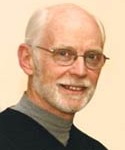Posted to the Brainstorm blog of the Chronicle Review, October 19, 2008.
http://chronicle.com/review/brainstorm/katz/michael-s-mahoney-rip
It was a beautiful day in Princeton yesterday. The sky was blue and cloudless, and the air was crisp. The Brown Bears were in town to play football with the Princeton Tigers. But several hundred friends of the historian of science Michael S. Mahoney were not walking across our beautiful campus. We were gathered in the university chapel for Mike’s memorial service. It was an occasion as sad as usual when we are memorializing a beloved and admired colleague. But it was also an uplifting occasion, as is so frequently the case when remembering a wholly admirable person.
Mike earned his Ph.D. in history of science at Princeton, working with one of the giants of the field, Charles Gillispie — who was seated in the pew immediately ahead of me yesterday morning. Mike’s original specialty was the early history of European mathematics, and his dissertation described the career of the great mathematician Pierre de Fermat. He later also wrote about Descartes, Barrow, Huygens, and Isaac Newton. Mike several times tried to explain to me Fermat’s famous problem, with absolutely no success, but when our colleague Andrew Wiles solved the problem a decade ago, Mike’s work on Fermat was rediscovered and (once again) admired. Later in his career, Mike turned his attention to the history of technology, and especially to the development of computers, computer science, and software — he made the move from the 17th to the 20th century effortlessly, and emerged as one of the most important historians of computing. He and I shared an interest in the application of computing to humanities research and teaching, and he was a crucial guide to me in my work, for he understood both the theory and the technology in a way that I could not approach.
The speakers yesterday acknowledged Mike’s scholarship, but to a person they focused on Mike’s commitment to teaching. His daughter and son were eloquent in describing the dinner table “seminars” that Mike conducted at 6 p.m. every evening, and the chapel was full of former undergraduate and graduate students testifying to his passion for teaching and commitment to his students. He could explain the Scientific Revolution and the development of the ENIAC computer with the same ease and clarity. Both his children and his students avowed that Mike was always there for them.
Less remarked yesterday was Mike’s passion for working with school teachers. To be sure, a couple of speakers mentioned that Mike had been a member of the local school board. But he was also a stalwart of Princeton’s Teacher Preparation program, and a member of our committee to select New Jersey’s prize teachers every spring. For me, however, most important was his leadership of the board of the late and lamented National Faculty, an organization for many years devoted to facilitating the work of college faculty with high school teachers in several different subject matters. Mike was especially committed to working with teachers of mathematics and history, and he was both tireless and inspired in organizing the work of the National Faculty (to whose board he recruited me).
More than anything else, Mike was a quietly solidifying force in our history department. He never took sides in partisan conflicts, he kept in touch with everyone, and he exuded a passionate serenity that we all admired. He was, in short, the sort of person who holds departments and universities together without ever asking thanks. He was a swimmer and runner (whom I saw at 6 a.m. most mornings when I went out for a walk or bike ride), so it was shocking when his heart stopped while swimming in the college pool on July 23. It seemed too big a heart to stop, and all of us who gathered to remember Mike Mahoney yesterday are still puzzled by our loss. Sometimes we do not realize whom the most important people are until we lose them.
